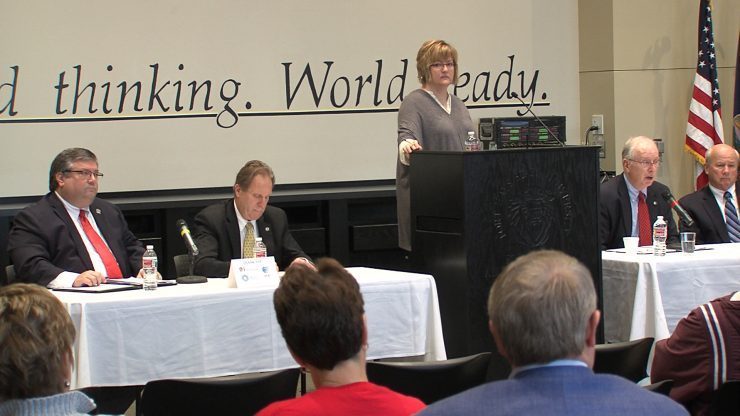
By BECKY KISER
Hays Post
The 2018 Kansas legislative session has just completed its fourth week and the state has a new governor.
Four area legislators updated constituents Saturday morning during a legislative coffee presented by the Hays Area Chamber of Commerce in the Fort Hays State University Robbins Center.
Sen. Rich Billinger (R-Goodland, 40th Dist.) and Reps. Eber Phelps (D-Hays, 111th Dist.), Leonard Mastroni (R-Lacrosse, 117th Dist.), and Ken Rahjes (R-Agra, 110th Dist.) agreed the legislature must focus on K-12 education funding. The state faces a Supreme Court ruling determining the funding formula to be unconstitutional and inadequate.
“The Gannon decision that is in front of the Kansas Supreme Court right now is really the big emphasis and we have to have something done by April,” said Mastroni. He thinks the revenues coming into the state which have been increasing since late last year will help fund schools, “not that those revenues couldn’t decrease.”
“We’ll probably be looking at a multi-year plan,” Phelps predicted. “The first year of $150 to $200 million, we’re on track with the revenues coming in where they are now, in addition to what’s already been budgeted, that’s $200 million additional going in this year. If the trajectory of revenues keeps coming in above estimates, I think we could legitimately put together a three to four year plan. It would still have to be approved by the Supreme Court.”
Rahjes is not as optimistic and feels there are “so many unknowns. The goal right now is to keep schools open and that means working with the judicial branch as well,” he said. “My guess is, regardless of what we do in the legislature and submit to the court, the court probably won’t agree and so we’ll be back in the summer to get something done under the gun that everybody will agree to keep schools open. I hope I’m wrong but finding the number of votes we need to move things forward is going to be a challenge.”
“It’s a balancing act,” said Billinger. “Education is important but we have to balance how much money we have and where it can go.”
“Raising taxes won’t happen,” Rahjes promised.
Instead, if revenues happen to decrease, budget cuts will be implemented. There’s been talk of an 18 percent across-the-board cuts for every state department.
“If we did that, three prisons would have to be closed,” Billinger said, “and nobody wants criminals back on the streets. The Department of Corrections would have to be pulled from that plan, leaving everybody else looking at a 30 percent budget cut. There are no easy choices.”
“I noticed Judge Glen Braun (23rd Judicial District Chief Judge) in the audience cringing when the senator mentioned the 18 percent cut,” Mastroni said later. “That’s because 97 percent of the budget for the judiciary is for employee paychecks. That would shut down our courts for around 90 days, creating a backlog and all kinds of chaos.” Mastroni is a former District Magistrate Judge.
Rahjes, a member of the House Taxation Committee, is encouraging Kansans to “shop local. We need to participate in our own economy.”
One written question from the audience was about the possibility of implementing sales tax on Internet purchases and whether Kansas would urge Congress to take such action.
The issue came up last week in the Taxation Committee, according to Rahjes. “It’s a simple matter of fairness to the Mom and Pop bricks and mortar stores,” he said. Rahjes proposed such a bill last year which did not move out of committee.
Kansas has the highest food sales tax in the nation. A Senate committee last week proposed the state sales tax on food would drop to 4 percent in 2019 and 2 percent in 2020. Local sales tax decisions would still remain the business of city and county politicians.
Rahjes said he plans to introduce a similar proposal this week, with the food sales tax gradually declining to zero.
Another audience question was about hemp production in Kansas. A bill has been passed out of the Senate Agriculture Committee (SB 263) that would allow the Department of Agriculture to conduct research with the state’s universities for industrial hemp production, and also permit some pilot programs.
Billinger is a member of the ag committee. He said the bill recommended Russell County as one of the pilot project participants.
“We had a lot of folks come in and testify to just let folks loose and start planting it. Then we had others concerned there was no way we could just turn them loose. It’ll take a little bit of time, but at least we’re getting started down that road. There’s many, many things that can be made from industrial hemp.” Phelps has talked to the staff at the K-State Agricultural Research Center in Hays and said the “dryland station would be an ideal place to test hemp production.”
Sponsors for the event were Midwest Energy, AT&T and the FHSU Foundation. The next legislative coffee will be in April.
